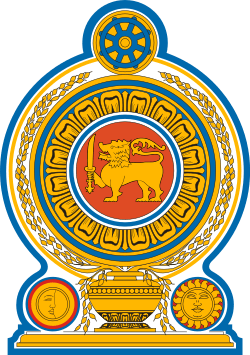Visa policy of Sri Lanka
Visitors to Sri Lanka visiting for tourism purposes must obtain an Electronic Travel Authorization (ETA), unless they are exempt, prior to arrival or on arrival to Sri Lanka or they must obtain a visa in advance. All visitors must hold a passport valid for 6 months. Nationals of Afghanistan, Iran, Iraq, Nigeria, Pakistan, Somalia and Syria must hold return or onward tickets.[1]
 |
|---|
| This article is part of a series on the politics and government of Sri Lanka |
|
|
Executive
|
|
|
|
|
Visa policy map

Free visa on arrival
On the basis of reciprocity, citizens of the following three countries are exempt from the requirement to obtain an ETA for Sri Lanka. They may obtain a visa on arrival to Sri Lanka at any port of entry without charge:[2][3]
|
Electronic travel authorization
Nationals of any country except the ETA-exempt countries and countries whose citizens require a visa in advance may obtain an ETA either on arrival to Sri Lanka or online;[2] however, visitors are encouraged to obtain the ETA online to avoid lengthy delays at the port of entry.[4] Holders of an ETA can then obtain a visa on arrival to Sri Lanka by presenting the ETA and passport to the Sri Lankan immigration officer.[2] A visa obtained on arrival is valid for 30 days, but can be extended up to 180 days.[2] The business purpose ETA can be obtained only from Sri Lankan diplomatic missions and head office of the Department of Immigration and Emigration.[3][5]
Temporary ETA fee exemption
The Sri Lankan Government announced a plan to allow citizens of certain countries to enter Sri Lanka without a visa for stays up to six-months from 1 May 2019, for a trial period of six months.[6][7] There was also a plan to extend the facility to countries of the South Asian Association for Regional Cooperation and China in the future.[8] This program was suspended following the 2019 Sri Lanka Easter bombings.[9]
A modified version of the plan was implemented on 1 August 2019. From 1 August 2019 to 30 April 2020 (initially 31 January 2020), nationals of the following countries who travel as tourists are exempt from the ETA processing fee, and thus may obtain an ETA free of charge:[2][10][11][12][13][14]
*: Singaporeans are also exempt from the requirement to obtain an ETA.
Visa in advance
Citizens of the following 20 countries must obtain a visa in advance from one of the Sri Lankan diplomatic missions:
Non-ordinary passports
Holders of diplomatic, official or service passports of the following countries may enter without a visa:[18]
D — diplomatic passports
O — official passports
S — service passports
Sri Lanka signed a visa exemption agreement for diplomatic or official/service passports with Ukraine in September 2019, but it is yet to be ratified.[19]
Statistics
| Rank | Country | 2016 | 2017 | 2018 |
|---|---|---|---|---|
| 1 | 356,729 | 384,628 | 424,887 | |
| 2 | 271,577 | 268,952 | 265,965 | |
| 3 | 188,159 | 201,879 | 254,176 | |
| 4 | 133,275 | 130,227 | 156,888 | |
| 5 | 74,496 | 81,281 | 110,928 | |
| 6 | 96,440 | 97,282 | 106,449 | |
| 7 | 95,167 | 79,371 | 76,108 | |
| 8 | 54,254 | 57,479 | 75,308 | |
| 9 | 58,176 | 59,191 | 65,497 | |
| 10 | 41,373 | 51,148 | 57,160 | |
| Total Foreign Arrivals | 2,050,832 | 2,116,407 | 2,333,796 |
See also
| Wikivoyage has a travel guide for Sri Lanka. |
References
- "Online Visa Application". www.eta.gov.lk. Retrieved 4 April 2018.
- "Country information (visa section)". Timatic. International Air Transport Association (IATA) through Olympic Air. Retrieved 1 April 2017.
- Rukmal, Nilantha. "Online Visa Application". www.eta.gov.lk. Retrieved 4 April 2018.
- Multiple countries get visa free entry to Sri Lanka for six months
- Sri Lanka to issue on-arrival visas from 1 May
- "Visa on arrival for 39 countries on hold". Colombo Gazette. Retrieved 2019-04-25.
- Free on-arrival visas for 45 nationalities
- In Bid to Revive Tourism, Sri Lanka Extends Free Visa-on-arrival Scheme Till April 30
- "Sri Lanka cuts off visas on arrival to stop flow of Muslims from Rakhine". mmtimes.com. Retrieved 4 April 2018.
- "Sri Lanka imposes visa restrictions for North Koreans - NK News - North Korea News". nknews.org. 27 September 2017. Retrieved 4 April 2018.
- "Sri Lanka imposes tougher visa sanctions on North Koreans ::. Latest Sri Lanka News". onlanka.com. 29 September 2017. Retrieved 4 April 2018.
- "Diplomatic & Official Visits". www.immigration.gov.lk. Retrieved 9 April 2018.
- TOURIST ARRIVALS BY COUNTRY OF RESIDENCE 2016
- Tourist Arrivals by Region - December 2016 & December October 2018
- Including Hong Kong and Macau.